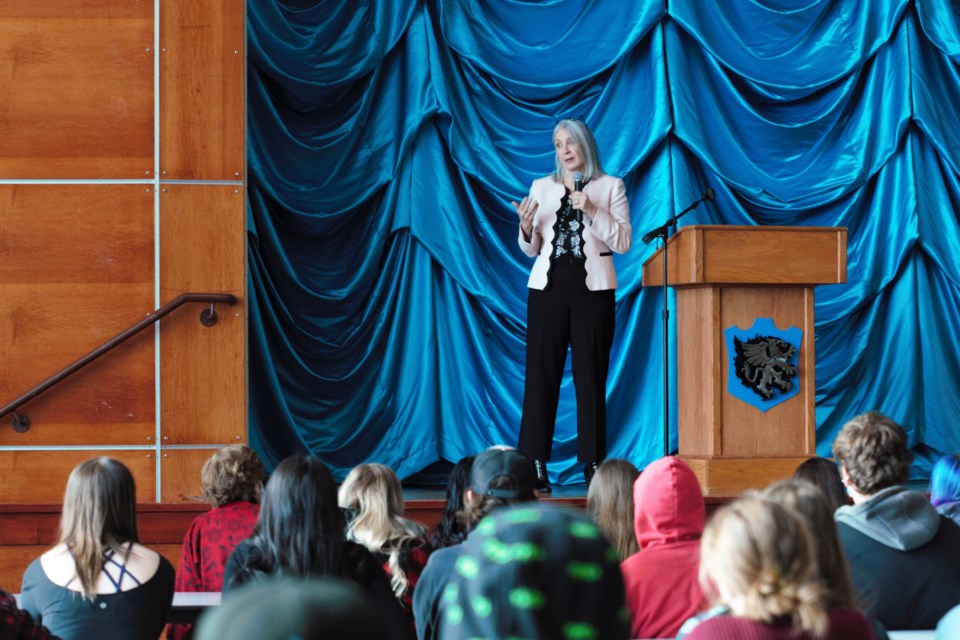THUNDER BAY – A group of Superior CVI students were in for a slightly unusual lesson Tuesday, as Thunder Bay–Superior North MP Patty Hajdu addressed an assembly at the North End high school in a talk about advocacy.
Hajdu drew on her own life experience as she delivered a message about the importance of supporting the most vulnerable and believing in second and third chances.
She recalled feeling she didn’t fit in during high school, after leaving home at the age of 16, and dropping out of university in her early 20s.
“I felt like a complete failure – I felt like I couldn’t succeed,” she said.
Hajdu credited an aunt and uncle who emphasized the importance of education, and a couple of “really, really good teachers,” including one at Superior CVI, for helping her navigate that time and later return to school at Lakehead.
“What got me through was the people around my life that were kind to me,” she said. “And it wasn’t just adults, it was also other young people, people who were kind in moments when they didn’t have to be.”
That lesson formed the foundation of her political philosophy, she said, underscoring the impact of offering support to those “who are the least powerful.”
“You can always be that person in the room when someone’s getting isolated, to pull that person back in, or to approach them after and say, it looks like that was hard. Is there anything I can do?”
It was a meaningful message for Grade 11 student Mehar Mago, who also serves as a student trustee on the Lakehead District School Board.
“It puts into perspective that even people who we see are so powerful are just people, and those who are struggling can still be powerful and strong and move past their own challenges,” she said.
Fellow Grade 11 student Nur Hasan said parts of Hajdu’s talk had resonated with her own feelings of isolation after coming to Canada from Turkey in 2016.
“Coming here, not knowing English, struggling to make friends, and seeing racism for the first time in my life was very hard, and it definitely caused me difficulties.”
She came away from the speech thinking about being more open with her struggles and talking to others about things that are bothering her, she said.
She was also happy to see her peers lob some tough question at Hajdu on issues related to her role as Minister of Indigenous Services.
One asked why the government did not appoint an Indigenous person to the role.
Hajdu said it would “very difficult” for an Indigenous person to do the job, saying it involves a daily confrontation of structures designed by white people that she said continue to oppress Indigenous communities.
“It would be hard, I think, for an Indigenous person, in some ways. I see every single day the ongoing systemic racism and oppression that Indigenous people face. I carry that with me every day, and I don’t get to look away.”
“In this job, you stare at colonization every day. Every single day, I think about how our society here in Canada was structured... about the fact that we’re on this blessed traditional territory of Fort William First Nation in the Robinson-Superior treaty area because people were dislocated, purposefully.”
Hajdu also pointed to progress under her government, noting the move toward self-governance agreements in health, education, and child welfare, a $40 billion settlement over discrimination in the child welfare system, and expanded funding to tackle issues like boil water advisories.
The federal budget still “doesn’t provide adequate money” for Indigenous communities to get all the services and supports they need, she said.
Hajdu added she wasn’t surprised to field some tough questions from the high school audience.
“People sometimes think it might be an easier audience, but actually, young people have really burning questions and really powerful questions. They want action and they want results. They want to know specifically what you’re doing to address whatever problem it is they’re thinking about.”
Students also asked Hajdu what her government was doing to make housing more affordable and to support LGBTQ communities, and how her job had been impacted by the pandemic.
